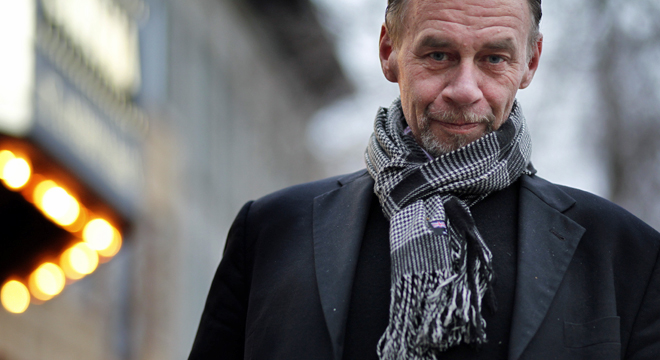David Carr, media columnist and culture reporter for The New York Times, talked recently to TPM about the future of news, the “glorious” view of the Port Authority Bus Terminal from his desk and what would happen if Twitter went dark tomorrow.
What is your writing/reporting day like?
Today, I spent far too much time on email and Twitter, and far too little time reporting a story I’m working on. I stayed up until 2 o’clock last night. I did sort of a personal elegiac post about Netflix, comparing it to my experience with AOL. I like to write at night. I’m kind of a vampire, and I have trouble writing in the newsroom. When I was first at the Times, I was pretty much on Business Day, cranking out stories, but I do better at home on the back porch or the kitchen table.
I wake up, four newspapers, usually get to two of them: New York Times and the Wall Street Journal. I also get the New York Post and the Star Ledger. I mostly look to Twitter to see what’s going on.
What does your media consumption look like on an average day?
The sort of hierarchy is: email is of the most interest to me; Twitter, second most interest; RSS, third most interest; and then I really don’t do any general web surfing. I don’t have a landing page. On my main Google page, there’s a bunch of widgets for like Ad Age and Poynter. My RSS is on there. Gawker is on there. I check The Guardian. Reuters is on my page. The Smoking Gun. A lot of Wired. Our own blog, Media Decoder. Salon is in there, that’s a recent addition. I think Salon is kind of coming along.
Can you answer the question you posed recently? Being a reporter is the ________ job in the world.
Well it’s the grandest caper there ever was. Really, if you can find work to be, sort of, professionally curious. I’ve always liked it, no matter how much I was working or not working. If you can find a way to make the economics work, it’s a pretty good way to go.
What’s the most significant journalism trend of 2012 so far?
This isn’t a trend yet. I have one of the new iPads. For both my email and Twitter, I’m able to talk into it and get speech to text (with Dragonfly voice-recognition software). It’s become more and more efficacious, which is great and convenient. If you start to think — one of the only barriers of people publishing is people have to type. What if that goes away? Just a huge explosion. Instead of going on the phone and talking about prom night, we’re either at or near a place where they can speak it in their phone and it’ll appear in text. What if people don’t have to type to get it into there? Does that make what we do more or less valuable? There’s more for us to sift through. But we’re the signal in the noise, and it’ll make us more valuable. I’m fairly democratic in my impulses. I don’t want more crap out there, but I think the fact that I need to type my thoughts means I share less of them.
Who’s doing good journalism on TV?
I used to work with Jake Tapper. I did a column that was off his reporting, about use of the Espionage Act. I just saw a very cool FRONTLINE thing on the financial crisis. I thought it was awesome. It made me think of the power of video and storytelling. I’m a Brian Williams watcher, but I’m usually still at work when he’s on. I’ve been setting the DVR on the weekends and watching Up with Chris Hayes. He’s sort of up to something else. I am working on a TV show, a web show, with A.O. Scott, and I made a little beta culture/media show. And it’s your basic, two doughy white guys talking into the camera.
As more and more TV sets become Web-enabled, I think the sort of boundaries — I’m in the radio business, you work at a blog, you work at a newspaper — whatever business you’re in, we all have text, video, little videos, big videos. It all sort of looks the same. I don’t think we’re in that different of a business.
What’s on your desk?
At work, I live on the fourth floor, which is in culture, and I’m in the corner. It’s a really glorious space. It looks out on the Port Authority (laughs), the Duane Reade. Right in front of me, I have a very large James Brown dancing figure and a lot of tin wind-up toys. There’s always coffee there, and there’s always Diet Coke and always a lot of crap.
At home, the coffee is always there and, more often than I’d like to admit, there’s an ashtray and a pack of cigarettes. I look out at a yard that could use some work and my bicycle.
Is there a general bad habit the news industry has right now?
The whole thing of, I put some top spin on something someone else did, and that constitutes work. That I put a little special sauce on top of somebody else’s get. It’s self-inviting, because that’s often what my column is: aggregation. But I like to think I phone call it in. I work it. I think it’s okay to aggregate and reframe within reason, just don’t pretend like it’s journalism.
The other thing is, now that there’s Twitter and the fights over scoops … no one cares. When the metrics of scoops get down to seconds and milliseconds, I don’t think it’s meaningful.
What do you think would happen to the news industry if Twitter went dark tomorrow?
I don’t think it would be a bad experiment. Twitter has a strong coastal bias. It’s got a strong media industry bias. When you’re in the Twitter dome, and you have something that blows up large, we grab onto it because it’s a place where we can see things pick up heat. But it’s sort of a false heat. It isn’t real. We’re all just shouting at each other. I got a look at my Twitter analytics, and I think if you start to guide yourself by what will trend within your group, you’re going to frequently end up in a tiny hole. But I love it. I’ve met real friends through it.
How will we get our news this time next year?
The rise of the visual Web is significant. I started working at Inside.com in 2000 and it was Michael Hirschorn who said, ‘That big picture and the small amount of text on your screen is your product. Everything else you write is gravy, it’s fine, but it’s not your product.” I do think people are going to be navigating in ever more visual ways. And I also think verbal navigation.
What do you tell recent journalism graduates or people trying to start a career in media?
I tell them that they should make stuff. The tools of production are at hand for everyone. I used to hire a lot of young people when I was the editor of Washington City Paper, and you used to have them show you the clips and see where else you worked. Show me what you’ve made with your own bare little hands. That, I think, is super important. People say, “You should’ve been here for the good old days.” I think that’s crazy. Yeah, it’s a little harder, but you have so many more tools at your disposal to story-tell. It’s cool to be in a business where you still learn. You don’t have to be able to code yourself, but you have to know what coding is. You should be able to work in Final Cut Pro. WordPress should be second-nature. I think, in generational terms, being able to produce and consume content at the same time.
What’s the best advice you ever got?
A couple of things. One is, I think, Michael Ventura — I don’t know who he is or where he is — said: Writing is something that happens alone in a room. Regardless of the cacophony around you, and the mayhem, and the data stream, you have to remember to engage the piece of work you’re on fully, and remember that language is the biggest tool at your disposal. Why get in the business of telling stories unless you’re going to do a good job at it?
The advice I always gave young reporters is congruence. Don’t be super friendly on the telephone then hang up and just nuke somebody. If it’s a hard story, you should communicate that. Congruence between the way you report and the way you write is important.
What’s the most under-covered story right now?
Who is fighting distant wars. It’s being fought by the same people over and over. As war becomes increasingly remote and mechanized, the accountability that goes with that sort of goes away. The changing nature of warfare and what it does.
What’s the last book you read?
I’m right in the middle of Kurt Andersen’s new book, True Believers. He’s the one who brought me to New York at Inside.com. I’m excited to see how this one turns out. Next one I have up is Fathers Day, which is Buzz Bissinger’s new book.
Any plans to write another book? What would you write about?
I’m not a big threat to write a book. I found writing a book to be really hard, and I enjoyed it. But if you still have a job and you’re writing a book, it will really ruin your life. I’m really interested in video and television, and chatting on that. I’m sure that’s an effective way to ruin your life as well. But I’m naive about that, and maybe I could stumble in that. A nonfiction book, it would be like my book and my website smashed together.










